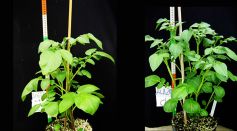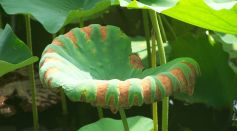Tags: Plants

Genomes of Roadside Weed Arabidopsis Thaliana Helps Scientist Understand Genetic Mutation

Behaviors of Animals and Plants Strongly Influenced by Gravitational Tides from Sun and Moon, Experts Confirmed

City Lights Confuse Urban Trees: Study Shows Climate Change and Daylight Extension Alter Growing Patterns of Plants

ABSTRAX Pins the Exact Origin of Cannabis’ Distinctive Skunk-Like Aroma in Scientific Peer-Reviewed Study

The Search For Life: 100 Years Research Institute at the Goetheanum

Beach Apple Poisonous Despite Fruity Appearance, Becomes More Toxic When It Rains

Iron Deficient Plants Optimize Photosynthesis to Protect Themselves From Damaging Effects of Sunlight
‘Mystery Plant’ Species Unveiled; New Type Found in the Amazon Rainforest Confirmed 50 Years After First-Ever Unearthing

Is Plant Farming on Mars Possible? Clover in Regolith Soil Develops Through Nitrogen-Fixing Bacteria
University of Mississippi and Hapten's Poison Ivy Vaccine Development Now in Clinical Trials
Phytoplasma Bacteria Knows How to Parasitize Plants; Slows Age Development and Turn Into 'Zombies'

Crop Plant Resiliency Using Energy Conversion Found During Photosynthesis; May Develop Immunity from Stress, Bacteria
Humans Growing Plants on Mars Impossible Due to Cosmic Radiation Exposure Rather Than Martian Soil
Plant-Animal Mutualism: Coevolution of Fruit Bats and Pepper Plants Linked to Biological Scent Sensory Ability
Earliest Land Plants 400 Million Years Ago Possibly Modified Earth's Climate Regulation
Underground Microbes Help Plants Survive, Reduce Stress Even in Poor Lighting Conditions
Ancient Plant Fossils Help Explain the Rise of Flowering Plants
Unique Plant Produces Odor Similar to Dead Insects Attracting, Trapping Coffin Flies
Ancient Judean Date Palm Tree Genomes Germinated from 2,000-Year-Old Seeds
Scientists Bring Back Forgotten Plant Species to Produce Climate-Resilient Coffee
Most Popular

How AI Is Used in Weather Prediction: Smarter Forecasting Through Machine Learning

The Future of Clean Tech: Exploring the Next Generation of Renewable Energy Breakthroughs

De-Extinction vs. Conservation Science: Which Approach Protects Biodiversity Most Effectively?

Geoengineering and Climate Intervention Science: Can We Really Engineer a Cooler Planet?





